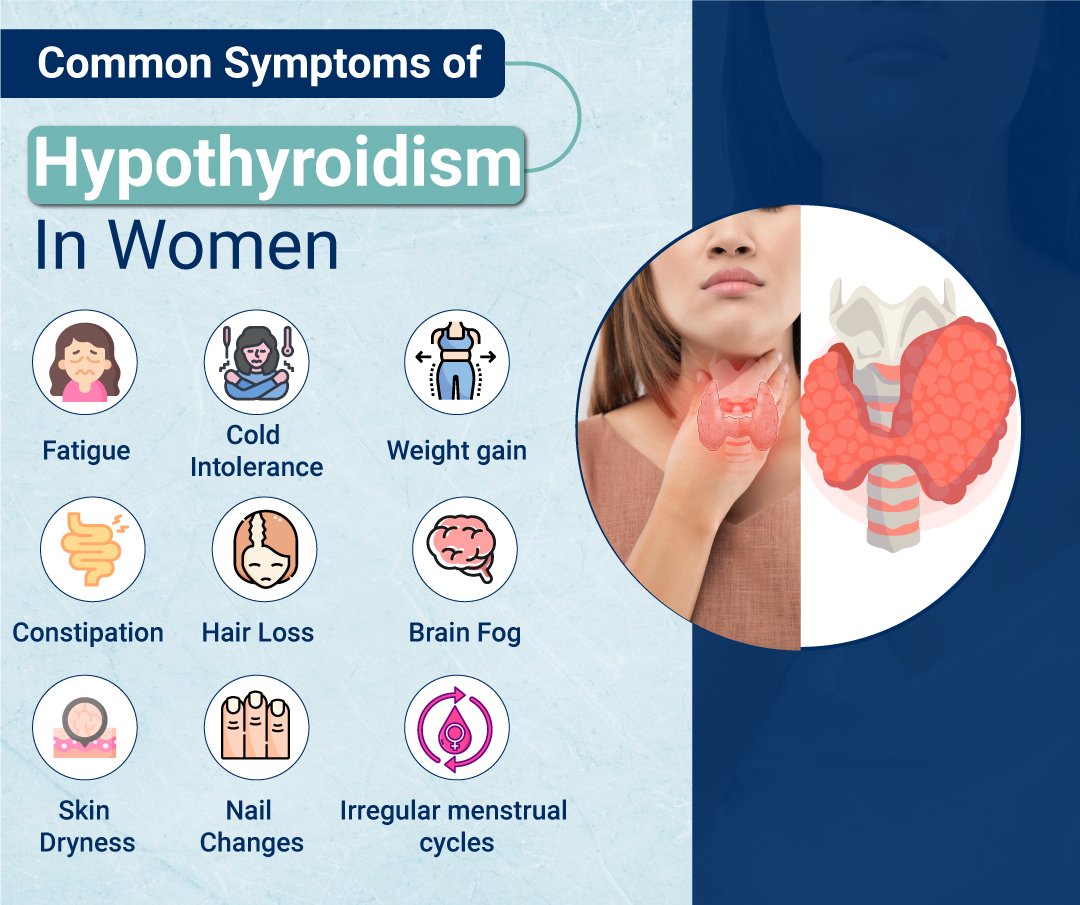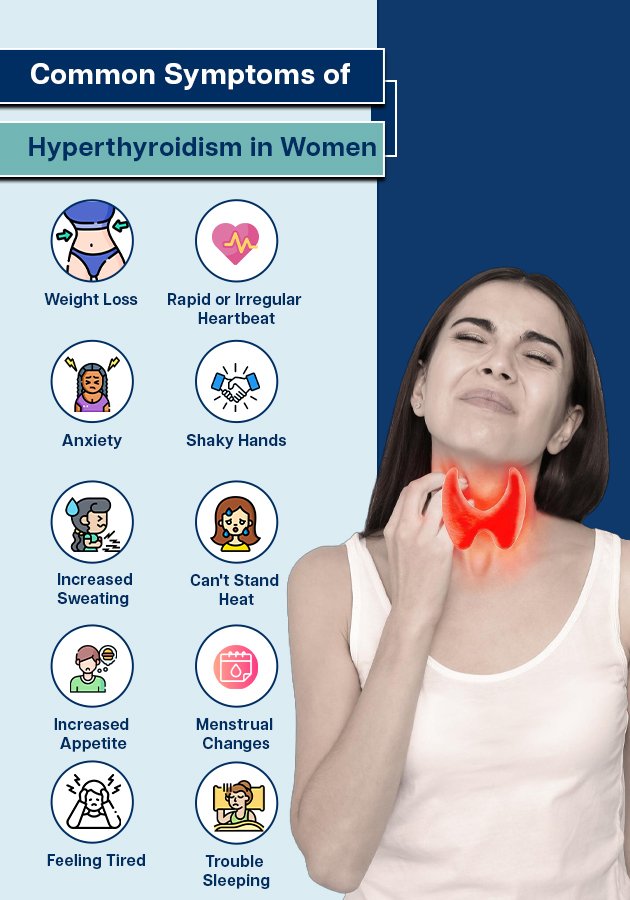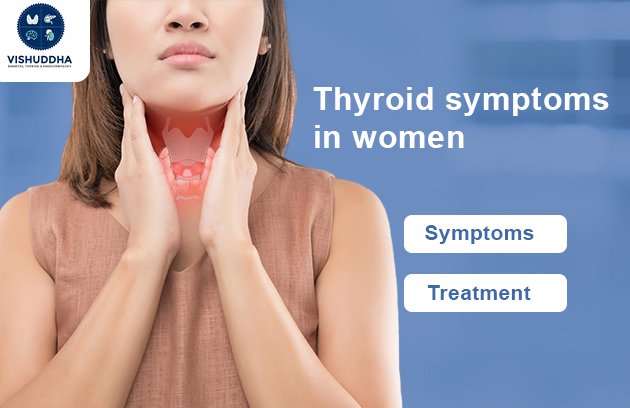The thyroid is a small, butterfly-shaped gland located near the throat. It produces two major hormones, T3 and T4, which regulate how your body uses energy, impacting metabolism, menstrual cycles, heart rate, and body temperature. When there is a thyroid problem in women, it can disrupt the balance of these hormones, leading to various health issues. This imbalance can manifest as either hypothyroidism, where the thyroid is underactive, or hyperthyroidism, where the thyroid is overactive.
Types of Thyroid Conditions in Women
Hypothyroidism (Underactive Thyroid):
hypothyroidism is the most common thyroid problem in women. Here, the thyroid is underactive and does not produce enough thyroid hormone. This can lead to a variety of health issues and impact daily life significantly. Underactive thyroid symptoms in females include:

- Fatigue: Persistent tiredness and lack of energy.
- Cold intolerance: Increased sensitivity to cold temperatures.
- Weight gain: Unexplained weight gain despite no changes in diet or exercise.
- Constipation: Difficulty with regular bowel movements.
- Hair loss: Thinning hair or increased hair fall.
- Brain fog: Difficulty concentrating and remembering things.
- Skin dryness: Dry and rough skin that may appear flaky.
- Nail changes: Brittle nails that break easily.
- Irregular menstrual cycles: Changes in menstrual frequency, flow, or duration.
- Underactive thyroid symptoms in females can vary widely, making it essential to recognize and address them early.
Hyperthyroidism (Overactive Thyroid)
In hyperthyroidism, the thyroid produces too much hormone, leading to an overactive metabolism. Symptoms of thyroid problems in women with hyperthyroidism include:

- Unintentional weight loss: Despite having a normal or increased appetite, women may experience significant weight loss.
- Rapid or irregular heartbeat: Palpitations, a feeling of a racing heart, or an irregular heartbeat.
- Anxiety: Increased nervousness, irritability, or anxiety without a clear cause.
- Tremors: Shaking hands or fingers.
- Increased sweating: Excessive sweating not related to exercise or heat.
- Heat intolerance: Difficulty tolerating warm temperatures.
- Increased appetite: Eating more than usual without gaining weight.
- Menstrual changes: Lighter or less frequent menstrual periods.
- Fatigue: Despite high energy levels, feeling constantly tired or weak.
- Difficulty sleeping: Insomnia or trouble staying asleep.
Recognizing these thyroid symptoms in women is crucial for prompt diagnosis and treatment.
Causes of Thyroid Problems in Women
Various factors can cause thyroid issues, each contributing to an underactive or overactive thyroid. Understanding these causes can help manage and prevent thyroid problems in women.
Autoimmune Diseases:
- Hashimoto’s Thyroiditis: The most common cause of hypothyroidism, where the immune system attacks the thyroid gland, leading to decreased hormone production.
- Graves’ Disease: The primary cause of hyperthyroidism is when the immune system stimulates the thyroid to produce too many hormones.
Certain Medications:
medications, such as lithium (used for bipolar disorder) and amiodarone (used for heart rhythm disorders), can affect thyroid function. These drugs can either reduce hormone production or cause thyroiditis, leading to temporary changes in thyroid hormone levels.
Hormonal Changes:
- Pregnancy: Hormonal fluctuations during pregnancy can trigger thyroid problems in women. Postpartum thyroiditis is a condition where the thyroid becomes inflamed after childbirth, leading to temporary hyperthyroidism followed by hypothyroidism.
- Menopause: Changes in hormone levels during menopause can also affect thyroid function, sometimes causing symptoms that overlap with menopausal symptoms, making diagnosis challenging.
- Iodine Deficiency: Iodine is crucial for thyroid hormone production. A deficiency can lead to hypothyroidism, while excessive iodine intake can cause hyperthyroidism. Ensuring an adequate but not excessive intake of iodine through diet or supplements is important.
- Radiation Therapy: Radiation treatments to the neck or head, often used in cancer therapy, can damage the thyroid gland and lead to hypothyroidism. Similarly, exposure to radioactive iodine can affect thyroid function.
- Genetic Factors: A family history of thyroid disease increases women’s risk of developing thyroid problems. Genetic predispositions can make individuals more susceptible to autoimmune thyroid conditions.
- Stress: Chronic stress can impact thyroid function by disrupting the balance of hormones in the body. Stress management techniques may help mitigate this effect.
- Nutritional Deficiencies: Deficiencies in essential nutrients, such as selenium and zinc, can impair thyroid function. A balanced diet rich in these nutrients supports healthy thyroid activity.
Diagnosis of Thyroid Problems in Women
Diagnosing thyroid problems in women involves recognizing symptoms and performing specific laboratory tests to confirm the condition. Given the variety of thyroid symptoms in women, a thorough evaluation is essential for accurate diagnosis and effective treatment. Symptoms alone can be a strong indicator of thyroid problems in women. However, these symptoms often overlap with other conditions, making self-diagnosis challenging.
- Laboratory Tests: primary care physicians can order lab work, including thyroid level testing. The most common tests include:
- TSH (Thyroid Stimulating Hormone) Test: this is the most sensitive test for detecting thyroid dysfunction. High TSH levels typically indicate hypothyroidism, while low TSH levels suggest hyperthyroidism. It is often the first test performed when thyroid problems are suspected.
- Free T4 (Thyroxine) Test: This test measures the level of free thyroxine in the blood, which is not bound to proteins and is available to the tissues. Low levels of free T4 indicate hypothyroidism, while high levels point to hyperthyroidism.
- Free T3 (Triiodothyronine) Test: Although less commonly ordered, this test measures the active form of thyroid hormone in the blood. It is instrumental in diagnosing hyperthyroidism, where free T3 levels are often elevated.
Additional Diagnostic Tools
- Thyroid Antibody Tests: these tests check for the presence of antibodies that may indicate an autoimmune thyroid disorder, such as Hashimoto’s thyroiditis or Graves’ disease. High levels of thyroid peroxidase (TPO) antibodies are commonly found in women with Hashimoto’s thyroiditis.
- Ultrasound: an ultrasound of the thyroid gland can help detect structural abnormalities, such as nodules or goitres, that may not be apparent through blood tests alone. This imaging test provides detailed pictures of the thyroid gland and can help determine the nature of any abnormalities.
- Radioactive Iodine Uptake Test: This test measures how much radioactive iodine the thyroid gland absorbs from the bloodstream. It helps differentiate between different types of hyperthyroidism and can provide insights into thyroid gland function.
- Thyroid Scan: A thyroid scan involves taking images of the thyroid after administering a small amount of radioactive material. This scan can help visualise the shape, size, and position of the thyroid gland and identify any abnormalities.
Importance of Regular Monitoring for Women
For women diagnosed with thyroid problems, regular monitoring of thyroid hormone levels is crucial. This helps ensure that treatment is effective and adjustments can be made as necessary. Women experiencing new or worsening symptoms should consult an Endocrinology Specialist in Ahmedabad for re-evaluation and possible adjustment of their treatment plan.
Recognizing thyroid symptoms in females and seeking timely medical advice is essential for managing thyroid problems effectively. By combining symptom awareness with appropriate diagnostic testing, women can achieve better health outcomes and maintain a higher quality of life.
Treatment of Thyroid Conditions in Women
Medication
Most thyroid conditions can be managed with medication. Hypothyroidism is treated with thyroid hormone replacement therapy, while hyperthyroidism may require anti-thyroid medications.
Surgery
In severe cases, such as an enlarged thyroid gland or thyroid cancer, surgical removal of the thyroid may be necessary. Post-surgery, patients will need thyroid hormone replacement therapy.
Special Considerations for Women
Pregnancy
Thyroid levels can change during pregnancy, requiring specialised care. The Women’s Medicine Collaborative offers an endocrine disorder in pregnancy program that focuses on the needs of pregnant women with thyroid conditions.
Menstrual Cycle and Fertility
Thyroid problems in women can affect menstrual cycles and fertility. Women with thyroid issues may experience irregular periods or difficulties in conceiving.
Conclusion
Thyroid problems in women are common but manageable with proper diagnosis and treatment. Understanding thyroid symptoms in women and seeking timely medical advice can significantly improve the quality of life. Regular monitoring and a healthy lifestyle are key to managing thyroid symptoms in females effectively. Dr Moxit Shah, an expert in thyroid disorders, emphasises the importance of staying informed and proactive. By following his guidance and seeking timely medical advice, women can successfully navigate the challenges posed by thyroid conditions and maintain overall health and well-being.







